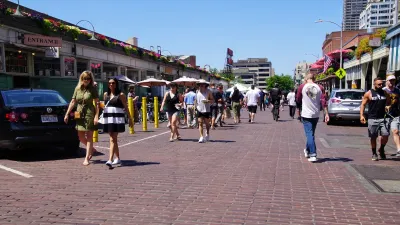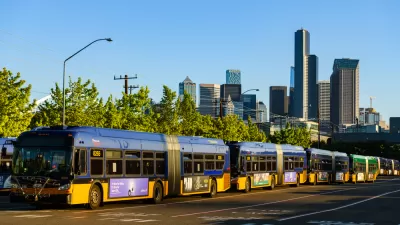The agency cites the high cost of the program and a county code that bars restroom facilities from transit centers as reasons for ending the six-month pilot.

King County Metro plans to remove two public restroom facilities at its transit centers, despite what The Urbanist’s Ryan Packer calls “promising results.”
As Packer explains, “Central Puget Sound has a dearth of public restrooms, particularly at transit facilities, with the few available often accessible for limited hours and many riders dependent on nearby private businesses for restroom access.” The six-month pilot was designed to explore options to expand restroom access.
“However, the pilot program’s high costs, mostly associated with providing 24-hour security to both transit centers to monitor the restrooms, will likely prove the biggest deterrent to making them permanent.” The program cost $568,567 to operate — with roughly 70 percent spent on security personnel.
Councilmember Rod Dembowski, who championed the project, said hiring 24/7 security may have been ‘overkill.’ Dembowski added, “There’s a long history in Seattle with struggling with public restrooms, they can be costly, difficult to maintain, but I think for the usability of our system and the riders, I think it’s something we ought to continue to work on.”
FULL STORY: King County Plans to Close Transit Center Restrooms Despite Promising Pilot

Planetizen Federal Action Tracker
A weekly monitor of how Trump’s orders and actions are impacting planners and planning in America.

Congressman Proposes Bill to Rename DC Metro “Trump Train”
The Make Autorail Great Again Act would withhold federal funding to the system until the Washington Metropolitan Area Transit Authority (WMATA), rebrands as the Washington Metropolitan Authority for Greater Access (WMAGA).

The Simple Legislative Tool Transforming Vacant Downtowns
In California, Michigan and Georgia, an easy win is bringing dollars — and delight — back to city centers.

The States Losing Rural Delivery Rooms at an Alarming Pace
In some states, as few as 9% of rural hospitals still deliver babies. As a result, rising pre-term births, no adequate pre-term care and "harrowing" close calls are a growing reality.

The Small South Asian Republic Going all in on EVs
Thanks to one simple policy change less than five years ago, 65% of new cars in this Himalayan country are now electric.

DC Backpedals on Bike Lane Protection, Swaps Barriers for Paint
Citing aesthetic concerns, the city is removing the concrete barriers and flexposts that once separated Arizona Avenue cyclists from motor vehicles.
Urban Design for Planners 1: Software Tools
This six-course series explores essential urban design concepts using open source software and equips planners with the tools they need to participate fully in the urban design process.
Planning for Universal Design
Learn the tools for implementing Universal Design in planning regulations.
Smith Gee Studio
City of Charlotte
City of Camden Redevelopment Agency
City of Astoria
Transportation Research & Education Center (TREC) at Portland State University
US High Speed Rail Association
City of Camden Redevelopment Agency
Municipality of Princeton (NJ)





























